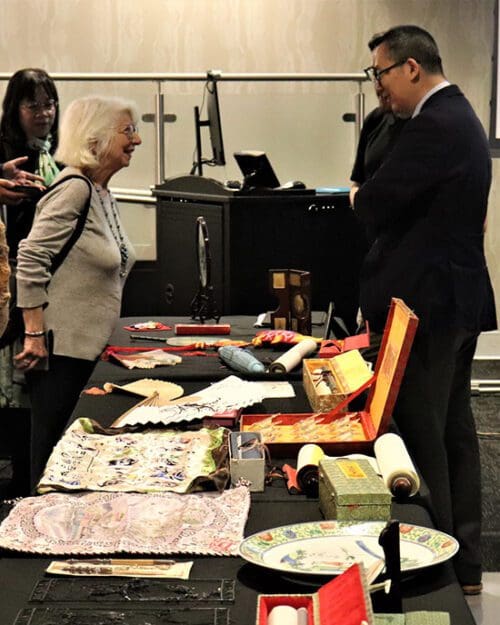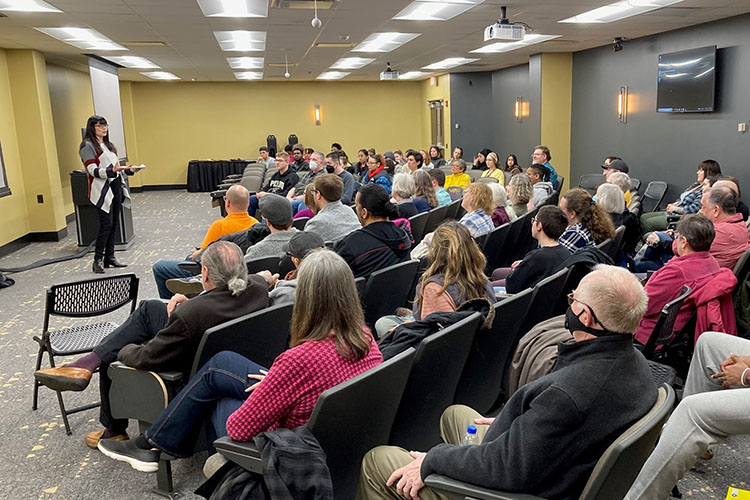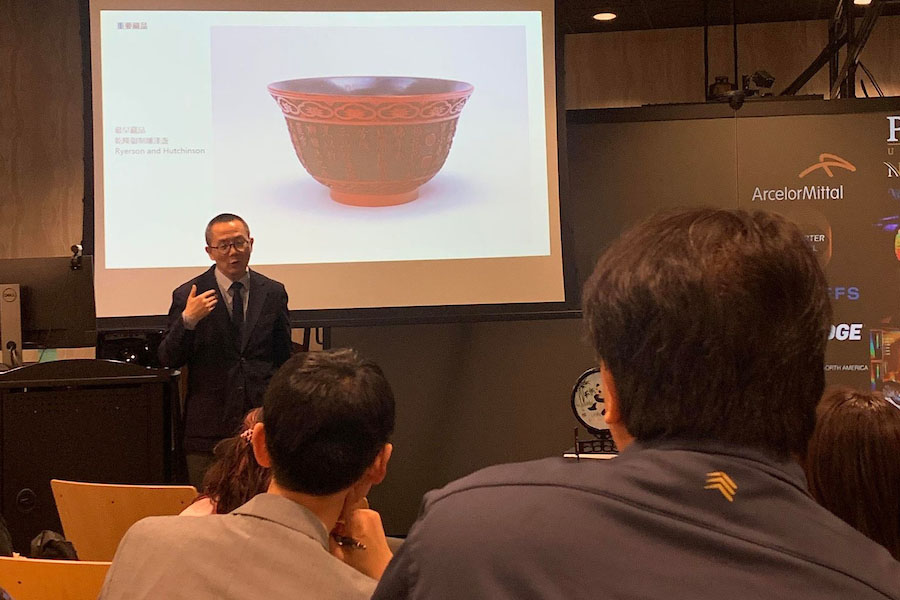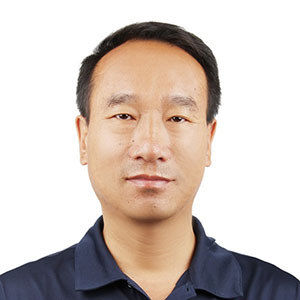Cultural Heritage Celebration Committee Highlights AAPI Topics

Tao Wang, Pritzker Chair of Arts of Asia, executive director of initiatives in Asia, and curator of Chinese art at the Art Institute of Chicago, right, shares information about PNW’s archive items from China.
This spring, Purdue University Northwest recognized Asian American and Pacific Islander heritage with several cultural events.
PNW’s recognition occurred during March and April to maximize campus outreach ahead of Asian American and Pacific Islander Heritage Month, recognized during May in the U.S. PNW’s events addressed topics such as history, art, and archaeology and recognize the accomplishments of AAPI peoples in history and at PNW.
See a brief recap of events hosted by PNW’s Cultural Heritage Celebration Committee in partnership with other departments below.

Erin Okamoto Protsman, left, continuing lecturer of Communication and Creative Arts, makes opening remarks during a screening of her co-produced documentary, “Without Due Process: A Documentary About America’s Concentration Camps.”
“Without Due Process” Film Screening, Presentation and Discussion
Erin Okamoto Protsman, continuing lecturer of Communication and Creative Arts at PNW, reshared her award-winning co-produced documentary, “Without Due Process: A Documentary About America’s Concentration Camps.”
During her time as a master’s student at PNW, Erin chose to research, conduct interviews, co-write, and co-produce a documentary format for her master’s project. The production recalls her own family members’ experiences living in the Japanese American concentration camps where they were forced to live after president Franklin Delano Roosevelt issued Executive Order 9066 simply because they resembled those from the Empire of Japan who attacked Pearl Harbor in 1941.
Erin’s documentary tells the story of her tight-knit Okamoto family as they endured this injustice, and the family’s outcome following the war. The documentary received both the Videographer’s Award of Excellence and the Communicator’s Crystal Ward of Excellence in 2002.
The event was co-sponsored by the Cultural Heritage Celebration Committee and the Department of Communication and Creative Arts.

Tao Wang, Pritzker Chair of Arts of Asia, executive director of initiatives in Asia, and curator of Chinese art at the Art Institute of Chicago, presents on Asian art in American museums in the Center for Innovation and Visualization Simulation (CIVS) theater.
“Asian Art in American Museums” with the Art Institute of Chicago’s Tao Wang
Tao Wang, Pritzker Chair of Arts of Asia, executive director of initiatives in Asia, and curator of Chinese art at the Art Institute of Chicago, presented on Asian art selections and influences curated in U.S. museums. Wang enlightened the audience on art pieces curated at the Art Institute of Chicago and their influences on the larger art world. Wang also spoke on several of PNW’s own Chinese cultural artifacts for its archival collection.
Wang joined the Art Institute of Chicago in 2015. His recent exhibitions include “Expressive Ink: Painting by Yang Yanping and Zeng Shanquing,”“Mirroring China’s Past: Emperors and Their Bronzes,” and “Xu Longsen: Light of Heaven.” He has published widely on topics related to Chinese art and archaeology and has won the China National Book Award and Antiquity’s best article prize.
The event was co-sponsored by the Cultural Heritage Celebration Committee and Chinese Student Association.
Secrets Under the Desert: Ethnic and Cultural Exchanges between East and West in Ancient Xinjiang from the Perspective of Archaeology

Bin Zhao, visiting professor of History, expanded on the historical and archaeological evidence available in the Xinjiang territory of China.
The Xinjiang autonomous territory in northwest China is a geographical and cultural crossroad for Eastern and Western Eurasia. The region has contained diverse ethnicities and cultures for thousands of years. The culture that is unique to Xinjiang developed due to the diversity that flows through the region.
Bin Zhao, visiting professor of History at PNW, discussed the ethnic migration and cultural changes that occurred in this region through the examination of early cultural relics and archaeological remains. These items and patterns show that Xinjiang became a central intersection of indigenous peoples and travelers and traders from afar brought into the region by the Silk Road.
The event was co-sponsored by the Cultural Heritage Celebration Committee and the Department of History, Philosophy, Politics and Economics.
About Asian American and Pacific Islander Heritage Month
The U.S. recognizes AAPI Heritage Month during May, celebrating the cultures and diasporas from the Asian continent, as well as Pacific island and Oceania communities. AAPI heritage was first commemorated by Congress in 1977. May was selected as it marked the arrival of the first Japanese immigrants to the U.S. in May of 1843. May also marked the anniversary of the completion of the transcontinental railroad in May of 1869, in which a majority of workers who laid tracks were Chinese immigrants.
To learn more about the Cultural Heritage Celebration Committee and other cultural celebrations at PNW, visit pnw.edu/inclusive-and-welcoming-pnw.